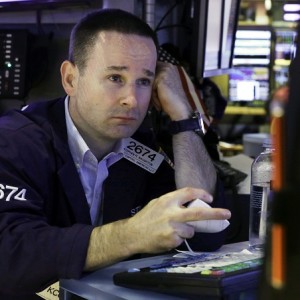Emerging markets facing ‘storm’

In this Thursday, Aug. 15, 2013, photo, specialist Stephen Naughton works at his post on the floor of the New York Stock Exchange. Expectations that the U.S. Federal Reserve will start to phase out its monetary stimulus had a mostly negative impact on global stock markets Friday Aug. 16, 2013. AP/Richard Drew
MANILA, Philippines–While inclement weather continued to paralyze Philippine markets, Asian emerging markets (EMs) are likewise battling a “storm” arising from a capital flight to developed markets in anticipation of the US Federal Reserve’s tapering of easy money policy.
EMs are continuing to suffer from weaker sentiment in developed markets (DMs) as investors are fearful that Federal Open Market Committee (FOMC) minutes and the Jackson Hole meeting this week might result in policy changes that will divert capital away from the emerging world, investment bank Credit Agricole CIB said in a research note on Tuesday.
Indonesia and India’s assets were under the most pressure due to vulnerability concerns arising from their current account deficits, Credit Agricole said.
In a separate note on Tuesday, Citigroup said the Philippines seemed as the “most insulated” to both US Fed tapering and China slowdown. “It has a very strong net external position, making it more insulated from taper; Philippines weakness has generated a positive income shock via the remittance channel; BSP (Bangko Sentral ng Pilipinas) is still easing liquidity; and it has limited trade linkages to China demand,” Citi said.
Central bankers and policy makers are set to meet in Jackson Hole, Wyoming on August 22 to 24 to discuss global economic and monetary issues. On the other hand, the minutes of the latest US FOMC meeting were expected to provide more clues to the Fed’s $85 billion monthly bond buying, which many are expecting to taper by next month.
Credit Agricole said the only positive story out of Asia on Tuesday was the announcement that China’s central bank would boost financial support for the economy and fine-tune its policy in the second semester. This suggests sustained stimulus in China in support of a 7.7 percent growth this year, Credit Agricole said.
For its part, Citigroup said growth risks from Fed tapering were likely to impact “deficit” and portfolio-dependent countries more, thus a bigger concern for current account deficit countries like India, Sri Lanka and Indonesia and more recently, Thailand. It was reported on Tuesday that Thailand had entered recession. Malaysia also looks relatively vulnerable given the large role of portfolio inflows, Citi said.
Infrastructure development is increasingly becoming more attractive to policymakers in emerging economies facing slowing economic growth but there is no automatic growth response to such. Instead, Citi said it will likely further erode the balance sheet strength that used to be a pillar of the EM story for investors.
Citi said the ability of monetary conditions to adjust would vary across Asia. Indonesia was cited as the most under pressure to hike policy rates to mitigate the impact of its external imbalances amid already high inflation, given its pursuit of a less flexible exchange rate policy.
Article continues after this advertisementOn the other hand, Citi noted that India had unexpectedly pursued measures aimed at curbing currency volatility by tightening liquidity and short-term borrowing costs. Given weak growth and moderating core, Citi said these measures were time-bound.
China growth risks are seen to hurt the more trade-linked economies, with East Asia looking more exposed to China slowdown risk relative to other regions. Citi sees this as a bigger risk to China-trade linked economies such as Singapore, Taiwan and Hong Kong, followed by Korea and Malaysia.
For the near term, Citi said a US growth upturn alongside a resilient Japanese rebound would more than offset the impact of a downside growth risk in China. Over the medium to longer term, it said the prognosis would be “much more uncertain.”
It is in this context that Citi had cited the Philippines as being the “most insulated” to these external headwinds.